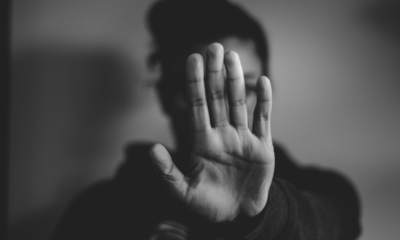Life
12 Characteristics of Toxic People and How You Can Deal With Them Effectively

We live in a world full of all kinds of different people, and learning how to interact with them successfully is a foundational life skill. When we’re young, we often enter into relationships believing we will be able to change the other person. The sooner we realize nobody changes just because we want them to, the sooner we can get to work on resolving interpersonal issues.
A caring attitude, mutual respect and clear communication are usually enough to break through roadblocks between friends, lovers and co-workers. When we’re dealing with toxic people, however, the standard rules do not apply.
Toxic people can be extremely charismatic. We often find ourselves charmed and immersed in a relationship before we realize what’s happening. Because toxic people behave in ways that are damaging to others, it is important to recognize them early.
Here are 12 ways you can recognize a toxic person:
- Toxic people live lives of intense drama, and it’s easy to get sucked in.
- Toxic people are completely self-centered. They make sure all attention focuses on them.
- Toxic people often appear to need constant rescuing.
- They are mean. A toxic person may mistreat you over and over, if you allow it.
- Toxic people try to control you through emotional manipulation.
- You never know what behavior to expect. Toxic people can be alternately kind or hurtful, calm or enraged. They keep you off balance.
- Toxic people frequently test you, asking you to prove your love or friendship.
- Toxic people lie. You can’t believe anything they tell you.
- Toxic people may be around when you have a crisis, but they will rarely share a happy moment. They like it when you are struggling more than when you are succeeding.
- They take every chance to bring you down.
- Toxic people judge you.
- They manipulate conversations to keep you confused.
“Sometimes you have to accept the truth and stop wasting time on the wrong people.”
How can you protect yourself from a toxic person?
Once you have identified a toxic person, the best way to deal with that person is to keep your interactions at a minimum. When possible, detach from the relationship altogether. Of course, complete withdrawal is not always practical.
Sometimes the toxic person is someone you must see at work, or a person in your family. If you make the choice to continue interacting with the toxic person, it is vital that you determine in advance the form of your interaction. Make a decision in which you will approach every interaction feeling centered and clear.
See the toxic person when necessary, but keep them at arm’s length. Check in with your body, and note any inner tension or anxiety. Give yourself plenty of space.
Do not be drawn into unnecessary conversation with a toxic person, and never attempt to justify yourself. Toxic people approach conversations as a win/lose proposition, so don’t waste your valuable time. Keep your interactions brief, polite, but superficial.
Have a clear sense of your own boundaries. If you are in a position of working with a toxic person on a project, decide early on what you will do and what is not acceptable to you. Be courteous but consistent. Having a toxic person in the vicinity is a great opportunity for you to practice establishing and enforcing your personal boundaries.
“Because at some point you have to realize that some people can stay in your heart but not in your life.” – Sandi Lynn
Most of us will encounter at least one toxic person during our lifetime. When you are able to identify them and protect yourself, you can think of this as a gift. Toxic people provide a great opportunity to practice operating autonomously, from a position of your own personal power.
How do you avoid letting toxic people into your life? Let us know by commenting below!
Did You Know
How Skilled Migrants Are Building Successful Careers After Moving Countries
Behind every successful skilled migrant career is a mix of resilience, strategy, and navigating systems built for locals.

Moving to a new country for work is exciting, but it can also be unnerving. Skilled migrants leave behind familiar systems, networks, and support to pursue better job opportunities and a better future for their families. (more…)
Life
10 Research-Backed Steps to Create Real Change This New Year
This New Year could finally be the one where you break old patterns and create real, lasting change.

Every New Year, we make plans and set goals, but often repeat old patterns. (more…)
Life
9 Harsh Truths Every Young Man Must Face to Succeed in the Modern World
Before chasing success, every young man needs to face these 9 brutal realities shaping masculinity in the modern world.

Many young men today quietly battle depression, loneliness, and a sense of confusion about who they’re meant to be.
Some blame the lack of deep friendships or romantic relationships. Others feel lost in a digital world that often labels traditional masculinity as “toxic.”
But the truth is this: becoming a man in the modern age takes more than just surviving. It takes resilience, direction, and a willingness to grow even when no one’s watching.
Success doesn’t arrive by accident or luck. It’s built on discipline, sacrifice, and consistency.
Here are 9 harsh truths every young man should know if he wants to thrive, not just survive, in the digital age.
1. Never Use Your Illness as an Excuse
As Dr. Jordan B. Peterson often says, successful people don’t complain; they act.
Your illness, hardship, or struggle shouldn’t define your limits; it should define your motivation. Rest when you must, but always get back up and keep building your dreams. Motivation doesn’t appear magically. It comes after you take action.
Here are five key lessons I’ve learned from Dr. Peterson:
-
Learn to write clearly; clarity of thought makes you dangerous.
-
Read quality literature in your free time.
-
Nurture a strong relationship with your family.
-
Share your ideas publicly; your voice matters.
-
Become a “monster”, powerful, but disciplined enough to control it.
The best leaders and thinkers are grounded. They welcome criticism, adapt quickly, and keep moving forward no matter what.
2. You Can’t Please Everyone And That’s Okay
You don’t need a crowd of people to feel fulfilled. You need a few friends who genuinely accept you for who you are.
If your circle doesn’t bring out your best, it’s okay to walk away. Solitude can be a powerful teacher. It gives you space to understand what you truly want from life. Remember, successful men aren’t people-pleasers; they’re purpose-driven.
3. You Can Control the Process, Not the Outcome
Especially in creative work, writing, business, or content creation, you control effort, not results.
You might publish two articles a day, but you can’t dictate which one will go viral. Focus on mastery, not metrics. Many great writers toiled for years in obscurity before anyone noticed them. Rejection, criticism, and indifference are all part of the path.
The best creators focus on storytelling, not applause.
4. Rejection Is Never Personal
Rejection doesn’t mean you’re unworthy. It simply means your offer, idea, or timing didn’t align.
Every successful person has faced rejection repeatedly. What separates them is persistence and perspective. They see rejection as feedback, not failure. The faster you learn that truth, the faster you’ll grow.
5. Women Value Comfort and Security
Understanding women requires maturity and empathy.
Through books, lectures, and personal growth, I’ve learned that most women desire a man who is grounded, intelligent, confident, emotionally stable, and consistent. Some want humor, others intellect, but nearly all want to feel safe and supported.
Instead of chasing attention, work on self-improvement. Build competence and confidence, and the rest will follow naturally.
6. There’s No Such Thing as Failure, Only Lessons
A powerful lesson from Neuro-Linguistic Programming: failure only exists when you stop trying.
Every mistake brings data. Every setback builds wisdom. The most successful men aren’t fearless. They’ve simply learned to act despite fear.
Be proud of your scars. They’re proof you were brave enough to try.
7. Public Speaking Is an Art Form
Public speaking is one of the most valuable and underrated skills a man can master.
It’s not about perfection; it’s about connection. The best speakers tell stories, inspire confidence, and make people feel seen. They research deeply, speak honestly, and practice relentlessly.
If you can speak well, you can lead, sell, teach, and inspire. Start small, practice at work, in class, or even in front of a mirror, and watch your confidence skyrocket.
8. Teaching Is Leadership in Disguise
Great teachers are not just knowledgeable. They’re brave, compassionate, and disciplined.
Teaching forces you to articulate what you know, and in doing so, you master it at a deeper level. Whether you’re mentoring a peer, leading a team, or sharing insights online, teaching refines your purpose.
Lifelong learners become lifelong leaders.
9. Study Human Nature to Achieve Your Dreams
One of the toughest lessons to accept: most people are self-interested.
That’s not cynicism, it’s human nature. Understanding this helps you navigate relationships, business, and communication more effectively.
Everyone has a darker side, but successful people learn to channel theirs productively into discipline, creativity, and drive.
Psychology isn’t just theory; it’s a toolkit. Learn how people think, act, and decide, and you’ll know how to lead them, influence them, and even understand yourself better.
Final Thoughts
The digital age offers endless opportunities, but only to those who are willing to take responsibility, confront discomfort, and keep improving.
Becoming a man today means embracing the hard truths most avoid.
Because at the end of the day, success isn’t about luck. It’s about who you become when life tests you the most.
Change Your Mindset
The Four Types of Happiness: Which One Are You Living In?
Most people chase success only to find emptiness, this model reveals why true happiness lies somewhere else.

In a world driven by rapid technological growth and constant competition, many people unknowingly trade joy for achievement. (more…)
-

 Health & Fitness1 week ago
Health & Fitness1 week agoWhat Minimalism Actually Means for Your Wellness Choices
-

 Did You Know1 week ago
Did You Know1 week agoWhy Most Online Courses Fail and How to Fix Them
-

 Business1 week ago
Business1 week agoIf Your Business Internet Keeps Letting You Down, Read This
-

 News4 days ago
News4 days agoBrandon Willington Builds 7-Figure Business by Ignoring Almost Everything
























5 Comments